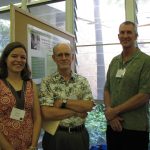Increasing First-Year Students’ (Writing) Success: An Assessment of the UH Writing Mentors Program
From fall 2007 to spring 2009, the UH Writing Mentors Program has reached approximately 1,300 students across 70 …


From fall 2007 to spring 2009, the UH Writing Mentors Program has reached approximately 1,300 students across 70 …

This study evaluates team teaching models of a new curriculum adopted by the University of Hawai`i’s journalism program …
Last Updated: 4 March 2024. Click here to view archived versions of this page. On this page: Note: The information and …